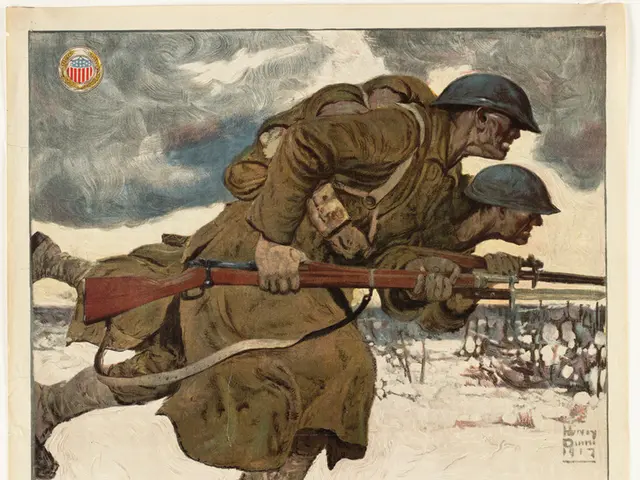Increased hostilities in Kashmir between India and Pakistan as tension intensifies, marked by intense artillery exchanges.
Things are heating up along the Line of Control (LoC) following a deadly attack in Indian-controlled Kashmir that left 26 tourists dead. Last night, Indian and Pakistani forces traded intense gunfire and artillery shelling, resulting in at least five civilian casualties.
On the Pakistan-administered Kashmir side, local police official Adeel Ahmad reported that heavy artillery fire from India took the lives of four civilians and injured 12 others. According to locals, the bombardment continued through the wee hours of the morning. Resident Mohammad Shakil of Chakothi, a village close to the border, shared, "We're used to the routine of Pakistani-Indian firefights at the LoC, but last night was different."
Meanwhile, Indian military officials declared that Pakistan's troops unloaded artillery, mortars, and automatic weapons on their positions at several locations. The Indian forces fought back, leading to hours of intense combat until the morning's first light. One woman was killed, and two civilians were injured in the Uri sector as a result of the skirmish, making the civilian death toll in India since Wednesday 17.
The tension between the two nuclear powers has grown since the April 22 attack on a popular Kashmir tourist destination. India holds Pakistan responsible for providing support to the perpetrators, a claim vehemently denied by Pakistan.
Just this week, India conducted airstrikes on what the nation deemed militant locations within Pakistani territory. While Pakistan insists 31 civilians were killed in those attacks, and their forces allegedly shot down five Indian fighter jets, India has acknowledged losing only two aircraft within its own borders. Both India and Pakistan have reported drone attacks on one another, although these claims remain unverified.
In other news, the Indian government has ordered X to block more than 8,000 accounts belonging to users in India, including those of international news outlets and prominent users. X argued that the order constituted an infringement on free speech, a fundamental right.
As the situation continues to escalate, the broader region grapples with the potential impact, such as the abrupt suspension of a cricket match in Dharamsala due to safety concerns. Several Indian states, including Punjab, Rajasthan, and Indian-controlled Kashmir, have ordered schools and universities to close, while airports have temporarily shut down due to security issues.
Related - Missile strikes by India kill 19 in Pakistan-controlled territory - Iran's FM visits Pakistan to mediate India tensions after deadly Kashmir attack
As global leaders urge caution, US Vice President JD Vance reiterated that any potential war between India and Pakistan isn't their business. He emphasized their efforts toward de-escalation but declined to pledge U.S. involvement.
- The intense artillery fire from India on the Pakistan-administered Kashmir side has prompted the Indian government to order the blocking of more than 8,000 accounts, including international news outlets and prominent users, in an attempt to control the flow of information about the worsening situation.
- The WhatsApp accounts of users in India have been targeted under this directive, sparking concerns about freedom of speech and the right to access information, especially amidst the ongoing war-and-conflicts and political tensions between India and Pakistan.
- In a surprising turn of events, even sports activities have been affected by the escalating conflict, as a cricket match in Dharamsala was abruptly suspended due to safety concerns, reflecting the far-reaching effects of the war-and-conflicts on the region.
- As sports-betting in India gains popularity, many wonder how the current political situation might impact gambling activities, as tensions, especially in sensitive regions like Kashmir, could lead to further uncertainty and instability.
- Amidst the General News of the ongoing war-and-conflicts, crime-and-justice issues, and political developments, many look to sports as a form of escape and diversion, hoping that the much-anticipated matches among local and international teams will continue uninterrupted, providing much-needed entertainment and a momentary respite from the chaos.








